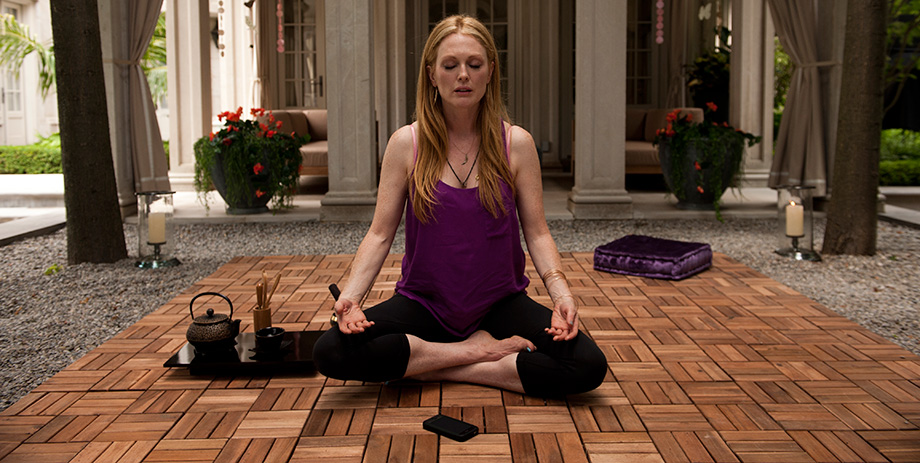When I finished watching the latest David Cronenberg movie, Maps to the Stars, I was left with two thoughts. First, I really hate the name, because it uses two plurals, and every time I say “Maps to the Stars” it feels like a mistake. Second, more importantly, I was tired. I was tired of watching, I was tired of taking notes, and I was tired of trying to find the bigger ideas and comments Cronenberg intended to make.
Not only is it is bleak and gross and unpleasant, but Maps to the Stars is also not a thrill ride, nor is it an engrossing piece of cinema. It left me feeling much the way I felt watching one of those Saw movies in a diner airport during a blizzard: a complete lack of respect for the person who thinks so little of the world and of the people around him that it would lead him to make that. I watched Maps to the Stars during a blizzard as well, but this time I was tucked in bed with my loving cat sitting next to me. It didn’t help that feeling, and it lingers.
Maps to the Stars isn’t a complicated movie narratively or thematically. A burn victim named Agatha Weiss (Mia Wasikowska), returns from Florida and begins working for a narcissistic fading star named Havana (Julianne Moore). Agatha is doing all this to get closer to Havana’s guru – and Agatha’s estranged father – Dr. Stafford Weiss. Agatha also has a teen star brother named Benjie (Evan Bird), who has already gone through rehab. It isn’t surprising that Benjie turned to substance abuse with a father like Stafford, who sent his sister away after she set fire to the house and drugged Benjie as a child. Benjie’s mother, Christina (Olivia Williams) is no help, as she is clearly psychologically damaged by the family tragedy as well. Agatha begins dating a limo driver (Robert Pattinson), who, Havana also finds attractive, and tensions flare between everyone involved.
There are plenty of allusions to other movies and stories, from Greek tragedies to Sunset Boulevard. But the overriding themes of Maps to the Stars involved incest, mental illness, child abuse, and mommy issues… lots and lots of mommy issues. I shouldn’t be surprised that the director of The Brood still sees mothers as the root of so many long-lasting problems. And while there is certainly a bad dad in this mix, the underlining idea that mothers plant seeds in their children is very clear here, especially with Havana, whose only real purpose is to express those concepts (and because she’s played by Julianne Moore). Moore gives an excellent performance (as usual) and deserved the best actress honor at Cannes; but her character is in it a lot considering her distant connection to the family and main storyline. Because of this, she seems more like an opportunity for Cronenberg to cheat the audience by telling more than he is showing through character interactions.
The focus of the film, the reason the film works when it occasionally does, is the family relationships. The moments when we see the deeper love behind the damage they are causing each other is when the film is actually interesting. The two best scenes in the movie are between Bird and Williams in a hospital, and Wasikowska and Williams in the home. Those all-too-brief scenes between mother and child show signs that there could have been a very good family drama in this film; but those moments are brief, and then we’re back to the film’s shallow framework. Williams has moments of greatness here, but every actor goes to so many different levels and styles of acting that there’s never an opportunity to settle and invest in the characters or satire.
The movie looks great, as most Cronenberg movies do, and I can appreciate his willingness to use horror visuals and go to extremes in what is essentially a domestic melodrama. But for a movie about Hollywood, he has no original or personal commentary to make on it. There is no sense that there was something bigger that he and screenwriter Bruce Wagner (New Nightmare) wanted to tackle by telling the story this way and in this setting. Characters like Havana and Benjie aren’t based on real people so much as generic tabloid types.
Had the film been funnier, I could understand using these broad character tropes, but the movie is almost never actually funny, which makes it all seem very childish because of the way it uses such serious problems as fodder for salacious and often grotesque filmmaking. I felt no kinship or empathy for the characters, because they never seem real, but I did have great empathy for the people being targeted by the filmmakers. Maps to the Stars may be Cronenberg and Wagner’s opportunity to take aim a Hollywood, but instead they seem like the cruel, insensitive, opportunists.
Lesley Coffin is a New York transplant from the midwest. She is the New York-based writer/podcast editor for Filmoria and film contributor at The Interrobang. When not doing that, she’s writing books on classic Hollywood, including Lew Ayres: Hollywood’s Conscientious Objector and her new book Hitchcock’s Stars: Alfred Hitchcock and the Hollywood Studio System.
Are you following The Mary Sue on Twitter, Facebook, Tumblr, Pinterest, & Google +?









Published: Mar 14, 2015 11:00 am